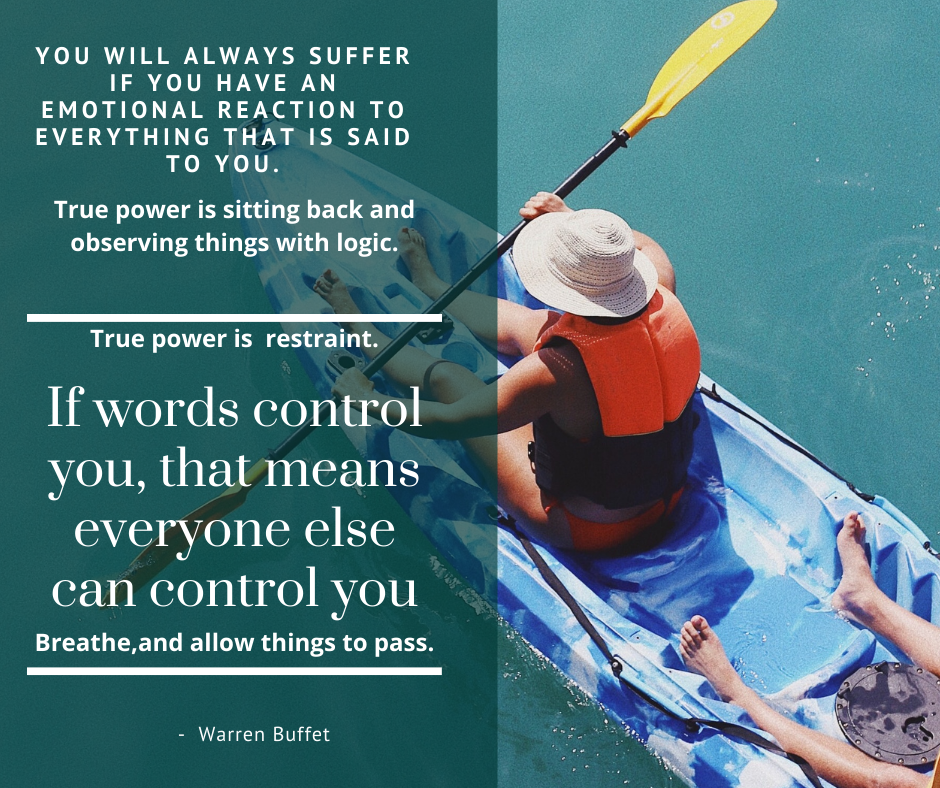If you are not in control of your emotions, someone else is.
If someone controls your emotions, then that someone controls you: your ex, your cellphone's feed, the guy in the mall that wants to sell you something, your close relatives, your coworkers, your boss…
The list doesn’t end: as long as it’s someone that knows how to trigger you.
Is not that they “have power over you”.
It’s more likely that you give away your power for them to control you.
And you do it every time you don’t control your emotions.
“Pavlov rang the bell, then fed the dogs'. After doing this repeatedly, the pairing of food and bell eventually established the dog's Conditioned Response of salivating to the sound of the bell. After repeatedly doing this pairing, Pavlov removed the food and when ringing this bell the dog would salivate.”

This is a conditioning technique. Also used on humans in many ways to condition people to a certain behavior.
It’s important to be conscious of that specific conditioning technique.
Social media use it, advertising uses it. Why shouldn’t you use it to inculcate good emotions and habits that work as means for you to achieve your own set goals?
Why shouldn’t you take charge of yourself?
Why shouldn’t you have a conditioned response to the sound of your own bell?
Why shouldn’t you control your emotions and or, trigger emotions that benefit you?
1. What Are Emotions And How Do They Get Triggered?
Some decades ago emotions were completely despised when compared to the importance of rational thinking.
These days the acknowledgment of emotions is important as we understand the intrinsic interaction between the body and the emotions feelings and thoughts, the impact that emotions have over your body (fear or stress for example), and how the body responds to certain emotions.
Is not very reasonable to neglect your emotions.
Emotions should be controlled, must be processed, dealt with. Emotions should not be suffocated. That is not a good strategy.

"Unexpressed emotions will never die. They are buried alive and will come forth later in uglier ways."
- Sigmund Freud
Let’s first see what’s an emotion: according to the site “Very Well Mind”
To have an emotion involves:
1. A subjective experience
It means that an emotion is personal and subjective. It depends on your perception of the world, depends on the meaning you give to your own experiences.
2. A physiological response
Your body has a chemical response to it: brain wave activity changes, electrochemical signals are delivered from the brain to the body, muscles react, hormones are delivered, temperature of the body changes, heart rate changes…
3. A behavior response
You react as you can, as you know or are used to react, according to the meaning you give to it.
In 1972 psychologists suggested the existence of 6 main emotions: fear, disgust, anger, surprise, happiness, and sadness.
But everything’s evolving and so labeled on emotions. In 1999 other basic emotions were included: embarrassment, excitement, contempt, shame, pride, satisfaction, and amusement.
In this century the wheel of emotion is discriminated into Low emotions and Elevated emotions (like love, trust, joy, anticipation, interest, serenity, admiration…)
What triggers them?
That’s the heart of the question: you should be the first to know. Before others perceive “you trigger” and manipulate it against your interest.
I know: sometimes is not easy, sometimes emotions are unconscious: you have that subjective experience that you no longer recall consciously. But you still react the same way.
What to do? Unveil it to yourself. Be brave now, and unveil it.
And it might not just be a matter of bravery: you might need to find ways to bring the unconscious to the conscious mind…
It takes some practice: but get used to observing your thoughts.
And what is no longer hidden, can no longer hurt.
No one is saying it’s easy: but if you bring it up to the conscious mind is a lot easier to be untriggered, or create an anti-trigger.
Meditation or breathwork can’t stress enough: it really helps in bringing that what is in the unconscious mind, out to the conscious mind.
2. Shield Yourself From Narcissistic Waves
Narcissistic waves… If you ever related to a narcissistic person (any kind, not necessarily loving relationship, could be friendship, coworker) and manage to no longer engage in that toxic relationship you know that you were conditioned. You know that you had certain responses in certain circumstances: you were being trained (conditioned).
Let's give some context: narcissists feed on your attention, devotion, dedication.
They are insatiable. Nothing is ever enough: just take from you, little in return. And they work on your self-esteem in slow doses. Little comparisons, direct or indirectly, to make you feel, somehow inferior (someone else is better than you), guilty or unworthy (of something you have, material or not).
In a narcissistic mind, if you have more than he/she has, you’re guilty. Whatever that is: money, friends, clothes, personal shine, intelligence, goodwill… Whatever. They will try to stripe that away from you, to make sure that they are the center. Nothing can distract you from them.
If you have less, you’re unworthy. Whatever it is that you have less than he/she has: you’re unworthy of his/her mighty presence in your life.
And then they manipulate you to their convenience, to keep this parasite/host relationship.
And to manipulate you they use what they know about you to trigger those feelings of inferiority, guiltiness, or unworthiness.
And you, getting triggered, react in the way they expect you to (because a narcissist knows how to chose their feeding sources), and there you go: reinforcing those feelings of inferiority, guilt, and unworthiness. here you go feeding the narcissist ego. Pavlov dog conditioning.
But let’s face it: we’re living in a narcissistic polarized culture. If you are not one: you’re supposed to fake it. Otherwise, there’s a huge risk of being taken as prey for narcissists.
And that’s why is important to control your emotions.
3. How Important Is To Control Your Emotions?
Whether you want to or not, your emotions exist. And they play a big role in your daily life: in your perception of yourself and your perception about circumstances or others.
If you acknowledge them, they can help you in decision making, in self-care, in your day-to-day interactions.
In case you don’t acknowledge your emotions are more likely to be overtaken by emotions and just react. Instead of you being in charge: your emotions are. Is no longer you speaking or making decisions: is your anger shouting or your fear screaming.
The spectrum is vast: you know who your “enemies are”. And they normally are attached to the habit of reacting in a determined way.
The problem with just reacting is that might lead you to unpleasant places: words that are spoken and you cannot withdraw, attitudes you have that you can’t just undo.
You have to have an internal signal to break the cycle when you start getting overwhelmed by emotion.
But first, you have to acknowledge your emotions: label them.
4. Label Your Emotions: Give Them A Name
Label your emotions.
Learn to identify what you are feeling. Acknowledge it. It will avoid, and bad decisions and posterior stress.
Let us say that on a normal working day your boss says something that irritates you.
You don’t even realize you are irritated because your normal response is to avoid conflict with your superior hierarchy.
Then you have to interact with a subordinate: you’re still irritated.
The subordinate senses your latent aggressivity, he gets nervous and gets even at you. Or because he feels undervalued: he just doesn’t deliver the task as well. You have to deal with the boss again: and carry another frustration.
You go home: and discharge where you can, soon as you can with who is available: your relatives, the people who live with you. You go to bed still stressed, don’t sleep well, wake up stressed and the next day starts again… With the same tone… It’s a never-ending snowball.
Let us say you acknowledge your emotion.
Let’s start the “same” previous day. This time with acknowledgment of emotion……
Your boss says something that irritates you.
You ask yourself: why it irritates me? Is it him or what is said? Is it because of this specific situation? Is he right? Or did he just cross over some value of yours?
These simple questions will change your whole scenario. You will not just react to the next person that comes around…
You’ll think it through and quickly. Is he crossing some boundary? Be assertive. Breathe and be assertive. Assertiveness makes people respect you the way you deserve.
He is right? Acknowledge it, take responsibility, and act according to that.
You won’t take irritation to the next level or to the next person.
The secret is asking what are you feeling and why are you feeling it.
5. Take Ownership Of Your Emotions
Once you recognize your emotions and label them: you are taking ownership of your emotions. They are officially yours.
You have to take care of them.
Reframe your thoughts to control your emotions.
Let’s say you get angry because a situation didn’t go according to your expectations. Whatever: go to your latest angry moment and picture it as if you were seeing a movie. From outside: don’t go living the anger again.
Angry is your body's emotional response to an obstacle. But beneath the anger, there is also a hidden fear.
A sequence of thoughts led you to anger. Try to remember the thoughts that led to that anger: What was your intent? Was it fair? What was the obstacle? What fear did that obstacle awaken? Of not being accepted. Of not being enough? Of not being worthy?
Now see it from the outside and from the other person's point of view? Was your anger reaction proportionated? What was the other person’s intent? Did you ask before allowing yourself to feel outraged?
Yes: you have to allow yourself to react. Unless your life is at stake of course.
The problem when you are overwhelmed with emotions is that you “assume”.
You create some scenario that is "played" according to previous situations of your life and you “assume”. It might be true but it also might be a construction in your head: it might be only your head.
If you are not in a position to speak openly: don’t react. Never assume.
What is done is done. But what to do in future situations?
- Breath and count up to 5-10 times before taking action, when you're under stress, or feeling overwhelmed by some strong emotion - that includes fear. Unless of course, your life is at stake: then let the fight-flight instant take over.
- Reframe your thoughts and think in terms of the best-case scenario.
- Reframe your thoughts and think in terms of a worst-case scenario.
- Balance and evaluate the best-case versus worst-case scenario.
- Decide.
Other suggestion. but not less important are to:
Use your own trigger phrases, one or two, to get you off overwhelming emotions and help you shift into elevated emotions:
- "I can do this"; "First breathe, then think, then act"...
If you train yourself to use trigger phrases, you'll be giving an order to your brain to act accordingly. When done systematically: it really works like a trigger.
It helps you return to your center, see the situation from the outside and focus on a solution, instead of being blinded by your own emotions or blinded by the problem or situation itself.
If being out of control is an issue that's resulting in both mental and physical illness, major losses, and damaging consequences in your life: you should consider getting professional help.
You're not doomed if you don't want to.
Controlling your emotions is a skill: you can learn.
And if you practice: you'll improve your life.

Emotional Hugs!

Hey! I'm Eunice Veloso and you'll find more about me in my About Page
"In nature, nothing is lost, nothing is created, everything is transformed"
Antoine Lavoisier, 1789
The Law of the Conservation of Mass
Songs in the this post:
